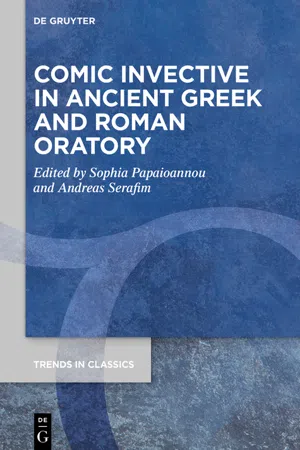An earlier version of this paper was presented at the 2019 FIEC/CA conference in London. I would like to thank Sophia Papaioannou and Andreas Serafim for their invitation to contribute to this volume. Many thanks also to Francesco Mari for sharing his thoughts on a draft and to Jon Hesk, who not only read and critiqued the paper in its final stages, but also sent me a copy of his unpublished essay “Vicious humour and virtuous argument in the Attic orators”. Unfortunately, Deborah Kamen’s book Insults in Classical Athens appeared too late for me to take its arguments and analysis into account.
1 Introduction
The use of personal, let alone humorous invective might, to a modern observer, seem inappropriate during legal proceedings for crimes carrying penalties as weighty as political disenfranchisement or execution. In the corpus of Attic orators, however, which contains speeches composed for just such settings, there are multiple instances of litigants insulting their adversaries, and often with language similar to that of the verbal abuse found in Old Comedy. In this contribution, I wish to explore that phenomenon and advance arguments about what the use of insults meant for Athenian orators as well as for the judges they hoped to persuade. I first consider the similarities between the insults of Greek oratory and those of the dramatic genre of Old Comedy, reinforcing but also adding nuance to the work of scholars who have established parallels between the invective in the two genres. The discussion then progresses to the anticipated effects of invective on the judges and the way that verbal abuse is talked about in the speeches. Demosthenes criticises the use of insults, yet this stands at odds with their prevalence in Greek oratory, not least in Demosthenes’ own surviving work. This discrepancy is discussed in the conclusion, where I suggest that Athenian litigants could find themselves needing to navigate a path between, on the one hand, indulging their audiences’ desire for enjoyable insults and, on the other, presenting themselves as moderate speakers capable of making cogent legal arguments.
2 Invective in Old Comedy and the Law-courts: Thematic and Verbal Similarities
The resemblances between comic and politico-judicial invective in classical Athens have not gone unperceived. Heath, for example, in his study of Aristophanes and the discourse of politics, uses Aristophanes’ Knights to demonstrate continuity between the disparagement of rivals on the Old Comic stage and that of rivals in the political struggles that played out in Athens’s law-courts.1 Heath wants to show that Aristophanic drama is political because it mimics or echoes patterns of real-life political discourse. In support of this thesis, Heath notes how in Knights, the character Paphlagon is accused of deception, flattery, slander, sycophancy and corruption, is charged with exploiting fear for his own political ends, colluding with foreign powers, undermining the principles of democracy, being of foreign or servile origin, being sexually depraved, having no shame and, finally, of adopting a vulgar rhetorical style. Following this roll-call of the Aristophanic Paphlagon’s crimes and character flaws, Heath goes on to identify, and again enumerate, plentiful instances in the speeches by both Demosthenes and Aeschines of precisely these same charges – sycophancy, deception, sexual depravity, collusion, servile origins, shamelessness, a deplorable speaking style and so forth – thus pointing to a distinct overlap in the topics of Athenian comic and Athenian judicial invective.2 Speakers in the two genres drew their derogatory accusations, Heath concludes, from the same pool of negative traits and behaviours. The shared motifs of verbal attacks, regardless of whether these provoked laughter, show that legal rhetoric and Old Comedy depended on a similar value system for the vilification of opponents.
The likenesses that Heath observes between the topics of invective in Old Comedy and those of judicial oratory are perhaps unsurprising. They occur not so much because comedy displays a keen interest in politics and the law (although that is a factor, as Konstantakos demonstrates in this volume), but rather because the two genres evolved and flourished under the same cultural conditions and invective typically reflects, in inverse fashion, the attributes or behaviours that a given community deems desirable. It is only insulting to say that someone employs a vulgar rhetorical style if one’s cultural group, and especially the addressee as well as any immediate audience, finds a vulgar rhetorical style to be objectionable. Insults operate, as Koster recognises in his study of Greek and Roman invective, against the backdrop of cultural norms and attempt to locate targets beyond the boundaries of those.3 Successful speakers will tap into the “social presumptions held by [an] audience” in order to depict their opponents as marginalised deviants.4 Seen in this light, the types of comic and politico-legal invective catalogued by Heath emphasise a distinction not only between the speaker and the addressee (viz. you belong to a negative category that I, the insulter, do not), but also between the insultee and the wider group – here Athenian citizens – from which the target is distanced. In the democratic law-courts of classical Athens, this could have been an effective way to alienate opponents from the judges and establish oneself as a relatable and therefore trustworthy narrator of events.5 Finally, as discussed in the Introduction to this volume, if the insults and invective also draw laughs from the judges, this can help ingratiate the speaker with the audience, while the target suffers a double disgrace, experiencing not just the affront of the verbal abuse, but also the humiliating laughter of their peers.6
Invective’s...
